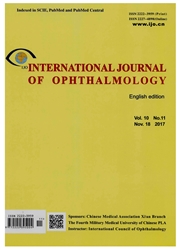

 中文摘要:
中文摘要:
AIM:To examine the relations between lymphangiogenesis and the size of pterygium.· METHODS:Tissues from 88 primary and 34 recurrent pterygia were evaluated,and those from 7 nasal epibulbar conjunctiva segments were used as controls.Pterygium slices from each patient were stained with LYVE-1 monoclonal antibodies to identify lymphatic microvessel for calculating lymph-vascular area(LVA),lymph-microvascular density(LMD) and lymph-vascular luminal diameter(LVL).Also,the relations between lymphangiogenesis(measuring by LVA,LMD and LVL) and the size of pterygium(extension,width and area) were explored.· RESULTS:There were a few LYVE-1(+) lymphatic vessels in normal epibulbar conjunctiva segments.However,the number of lymphatic vessels slightly increased in primary pterygia and dramatically increased in recurrent pterygia.LVA,LMD and LVL significantly increased in recurrent pterygia in comparison with primary pterygia(all P 【0.05).Both LMD and LVA were correlated with the width and area of pterygia(both P 【0.05),and LVA was also correlated with the extension of pterygia(P 【0.05).· CONCLUSION:Lymphangiogenesis is correlated with the size of pterygium.The outgrowth of lymphatic vessels might contribute to the development of pterygia.
 英文摘要:
英文摘要:
AIM: To examine the relations between lymphangiogenesis and the size of pterygium. METHODS: Tissues from 88 primary and 34 recurrent pterygia were evaluated, and those from 7 nasal epibulbar conjunctiva segments were used as controls. Pterygium slices from each patient were stained with LYVE-1 monodonal antibodies to identify lymphatic microvessel for calculating lymph-vascular area (LVA), lymph-microvascular density (LMD) and lymph-vascular luminal diameter (LVL). Also, the relations between lymphangiogenesis (measuring by LVA, LMD and LVL) and the size of pterygium (extension, width and area) were explored. RESULTS: There were a few LYVE-1 ((+)) lymphatic vessels in normal epibulbar conjunctiva segments. However, the number of lymphatic vessels slightly increased in primary pterygia and dramatically increased in recurrent pterygia. LVA, LMD and LVL significantly increased in recurrent pterygia in comparison with primary pterygia (all P<0.05). Both LMD and LVA were correlated with the width and area of pterygia (both P<0.05), and LVA was also correlated with the extension of pterygia(P<0.05). CONCLUSION: Lymphangiogenesis is correlated with the size of pterygium. The outgrowth of lymphatic vessels might contribute to the development of pterygia.
 同期刊论文项目
同期刊论文项目
 同项目期刊论文
同项目期刊论文
 期刊信息
期刊信息
